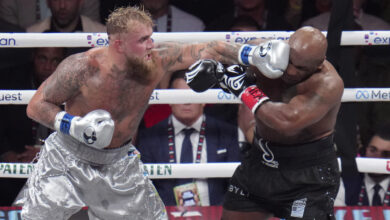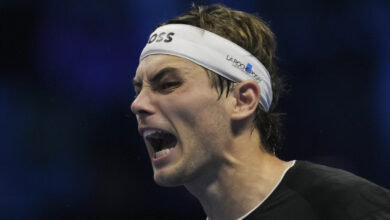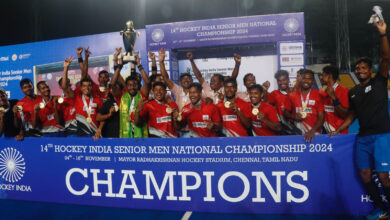What’s eating Jadon Sancho? | Football News

An adolescent Jadon Sancho lived on just one dream. It was to take his family out of stuffed lanes of Guinness Trust Buildings estate, a largely Caribbean settlement in South London’s Kennington, a stone’s throw away from the Kia Oval, the hallowed cricket ground, which also hosted England’s first international football fixture. It’s a dream thousands dream of, prosperity and fame, an escape from the grim realities of the rough neighborhood, where he often woke up to gunshots and brawls. But only a few achieve it, though the frequency of skilled footballers emerging from the region is increasing from the crumbling estates. “A few chosen ones,” once remarked his father Sean, who worked as a security guard.
His son though would disagree. It was not a stroke of destiny, even though he was fortunate enough to get his footballing skills noticed his class teacher, but the fruits of his labour. “It hasn’t been easy. I’ve had to work for this,” he told bundesliga.com during his coming-of-age days with Borussia Dortmund. He grew up playing in cages, parking lots and parks, in tiny congested spaces, with children older than him, those that bullied and battered him. So crowded were the playing that one make would see him pushed out, whereupon he had to wait for hours for another chance. You know where he got those nimble feet, delightful ball control and quick thinking. Many of them in adolescence smoked marijuana, and consumed cheap recreational drugs.
But amidst the irresible chaos, Sancho’s dream remained unscathed. At just seven, he joined Watford, two hours and three tubes away from his apartment. At 12, he shifted to the digs near the ground. “All that mattered was training, training and training. I would sleep on the pitch.,” he would say. In another two years, Manchester City would snaffle him, before he joined Dortmund, not only because he could get more first-team starts, but also he could come through their fabled youth system. Four prolific years later, when still a teenager, he joined Manchester United with much hype and fanfare.
It was projected as the ultimate rags to riches story, the boy from estates joining the most successful club in England. The wunderkind who remained humble and grounded, despite the riches. Sancho never dissociated from the neighborhood or his friends. He would often drop his school, give ample donations, and speak eloquently on his role as an icon of social change. “For the kids that are in south London I hope I can give a positive message. Don’t do those bad things,” he once said.
Jadon Sancho celebrates after scoring. (Reuters)
For a troubled locale, his words and deeds were inspirational. He was the poster boy of England’s South London boom, now a cradle of untamed potential, of raw children glued class and race, poverty and squalor, for whom football meant emancipation. So visible were his talents that Liverpool manager Jurgen Klopp observed that Sancho “could be one of the most important players of this generation”. No one who cast their eyes on him at Dortmund would refute. He would score goals from improbable angles, would wriggle through non-exent spaces, conjure impossible asss. He had pace, skills, tricks and intelligence. He was not just the missing piece in the interminable United rebuild, but the nucleus of their path back to greatness.
A career at a crossroad
Yet, into his third year at Manchester United, he finds himself at a crossroad, his career drifting aimlessly, his football stagnating. How his career has reached this stage is as unforeseen as it is unfathomable. Suddenly, he has become unprofessional, turns up late for trainings, in fact multiple times according to reports in England newspapers and televisions, apparently not just at United, but at Dortmund, where allegedly he was made to stay in an apartment so close to the training ground that he would not miss training, as well as with England too.
Manchester United’s Marcus Rashford, left, and Manchester United’s Jadon Sancho during the English Premier League soccer match between Manchester United and Fulham at Old Trafford in Manchester, England, Sunday, May 28, 2023. (AP Photo/Rui Vieira)
The row with United manager Erik Ten Hag, who has a disciplinarian trait—last year he dropped Marcus Rashford to the bench because he had once arrived late for training—escalated when Ten Hag told press that Sancho was dropped for the Arsenal game due to “his performances in training”. The England forward retorted, writing on X (formerly Twitter): “Please don’t believe everything you read! I will not allow people saying things that [are] completely untrue. I have conducted myself in training very well this week. I believe there are other reasons for this matter that I won’t go into, I have been a scapegoat for a long time which isn’t fair!”
Reportedly, the continuous selection of Brazilian winger Antony, despite his unflattering output frustrated him. In a strange tw of fate, Antony too finds himself away from the team after allegations of abuse three different women. The right wing of United seems cursed. It’s improbable to see Sancho marauding the space for the club ever again, not least when Ten Hag is around. Even more so after he refused to apologise for the social-media outburst. According to the club’s statement: “Jadon Sancho will remain on a personal training programme away from the first team group pending resolution of a squad discipline issue.”Most Read
1
Ridhi Dogra says it’s ‘unfortunate to play’ Shah Rukh Khan’s mother in Jawan: ‘He told me many times…’
2
“Selling a false dream”: Indian students abroad open up about mental health issues
See More
Typically, the Sancho saga has divided opinions. Some have grilled him, an ex-United player even commented that he would be axed on the spot had he played in the Alex Ferguson era. Even Roy Keane and David Beckham were censured for the laxity in training sessions. Some believe that he was badly coached at the club, a shallow shadow of its past glory, and that Ten Hag was like “a school teacher”.
A robust argument could be made for bad coaching, as he is not the only player whose game has plummeted after joining the club. From Angel Di Maria to Paul Pogba, Harry Maguire to Antony, a raft of big-money signings have flopped. So much so that it is difficult to thrust the whole blame on the player alone. No player is bigger than the club or country, but every player is different. Some require more trust and coaxing. It’s the resourcefulness of a manager if he could mend the ways of a straying player, if he could harness the potential of a player struggling to realise his immense gifts.
His future is subject to much intrigue and speculation. Perhaps, the manager and player could bury the hatchet, perhaps he could be reintegrated, perhaps he should snap ties with the club, treading the what’s-broken-can’t-fixed line, and leave the club in the next transfer window. But it’s unlikely that he would just wither away, his talents would perish un-blossomed. For, he is just 23, supremely talented and unflinchingly tough. How he recovers from this mess would perhaps define him, it could make or break him, but he would not give up without fighting for his cause and dreams, which he has since he was a child growing up in the Guinness Trust Buildings estate, built in 1921 on a government grant.







